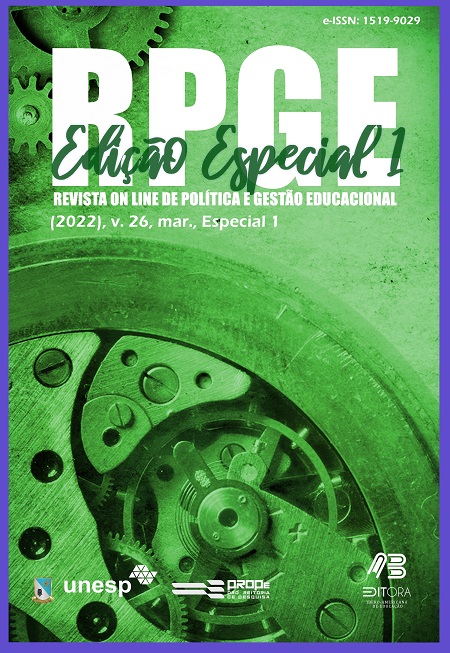Questões teóricas da gestão da formação em escolas profissionais segundo a abordagem da gestão da qualidade total
DOI:
https://doi.org/10.22633/rpge.v26iesp.1.16514Palavras-chave:
Gestão da formação, Escolas profissionais, Segundo a abordagem, Gestão da qualidade total (TQM)Resumo
A gestão da formação nas escolas profissionais segundo a abordagem da gestão da qualidade total (TQM) é um tema relativamente novo, que enfrenta muitas dificuldades devido à diversidade e ampla gama de atividades educativas em âmbito nacional e de estabelecimentos de formação. Esta atividade exige sempre inovação para corresponder ao rápido avanço do nível de desenvolvimento científico, tecnológico e técnico, criando assim produtos de qualidade e recursos humanos para atender às exigências da industrialização, modernizar o país. Este estudo aponta problemas teóricos ao gerir a formação em escolas profissionais segundo a abordagem da gestão da qualidade total e aplicá-la na prática. Estudar os documentos orientadores do governo vietnamita, bem como novos pontos de vista sobre gestão de treinamento em faculdades profissionais de acordo com a abordagem da gestão da qualidade total, ajudará os gerentes educacionais a orientar o desenvolvimento de faculdades profissionais do Vietnã no futuro.
Downloads
Referências
COMMUNIST PARTY OF VIETNAM. Documents of the 13th National Congress of Deputies. Hanoi: National Politics Truth, 2021.
DUC, T. K. Management and accreditation of human resource training according to ISO & TQM. Hanoi: Education, 2004.
DUC, T. K. Education and human resource development in the 21st century. Hanoi: Education, 2010.
HUNG, N. T. Education quality management. Hanoi: National University, 2015.
DEWEY, J.; BENTLEY, A. Knowing and the Known. Boston: Beacon Press, 1949.
KIEM, T.; THUC, N. X. General Science of Management and Educational Management. Hanoi: University of Pedagogy, 2012.
KIEM, T. Modern approach in educational management. Hanoi: University of Pedagogy, 2013.
MINISTRY OF EDUCATION AND TRAINING. Vietnam's education development strategy for the period of 2021-2030, with a vision to 2045. 2021. Available: https://moet.gov.vn/tintuc/Pages/tin-tong-hop.aspx?ItemID=7703. Access: 10. Oct. 2021.
MINISTRY OF LABOR, WAR INVALIDS, AND SOCIAL AFFAIRS. Developing high-quality colleges in an “open” direction. 2019. Available: http://www.molisa.gov.vn/Pages/tintuc/chitiet.aspx?tintucID=220718. Access: 10. Oct. 2021.
MINISTRY OF LABOR, WAR INVALIDS, AND SOCIAL AFFAIRS. Vocational College of Engineering and Technology: Appreciate the quality of training, not the quantity, 2021. Available: http://www.molisa.gov.vn/Pages/tintuc/chitiet.aspx?tintucID=224939. Access: 10. Oct. 2021.
PHE, H. Vietnamese Dictionary. Hanoi: Social Sciences, 1998.
SIMON MC. GRATH. Vocational education and training for development: A policy in need of a theory. International Journal of Educational Development, v. 32, n. 5, 2012.
SON, L. D. Management of training facilities of the university from the point of view of total quality management (TQM). 2012. Thesis (Ph.D. on Educational Management) – Vietnam National University, Hanoi, 2012.
THE NATIONAL COUNCIL DIRECTS THE COMPILATION OF THE VIETNAM ENCYCLOPEDIA DICTIONARY. Encyclopedia of Vietnam. Hanoi: Encyclopedia Dictionary, 2002.
TRI, N. D. Vocational education: some theoretical and practical issues. Hanoi: Science and Education, 2010.
TRUNG, T. Management of vocational education schools in the process of international integration. Hanoi: Education, 2012.
VU HONG, V. Management of educational activities in schools towards the approach of learners’ competency: A case study of a high school. Nuances Est. Sobre Educ., Presidente Prudente, v. 32, e021005, jan./dez. 2021. e-ISSN: 2236-0441. DOI: 10.32930/nuances.v32i00.9118
Downloads
Publicado
Como Citar
Edição
Seção
Licença
Copyright (c) 2022 Revista on line de Política e Gestão Educacional

Este trabalho está licenciado sob uma licença Creative Commons Attribution-NonCommercial-ShareAlike 4.0 International License.
Manuscritos aceitos e publicados são de propriedade da Revista on line de Política e Gestão Educacional. É vedada a submissão integral ou parcial do manuscrito a qualquer outro periódico. A responsabilidade do conteúdo dos artigos é exclusiva dos autores. É vedada a tradução para outro idioma sem a autorização escrita do Editor ouvida a Comissão Editorial Científica.











